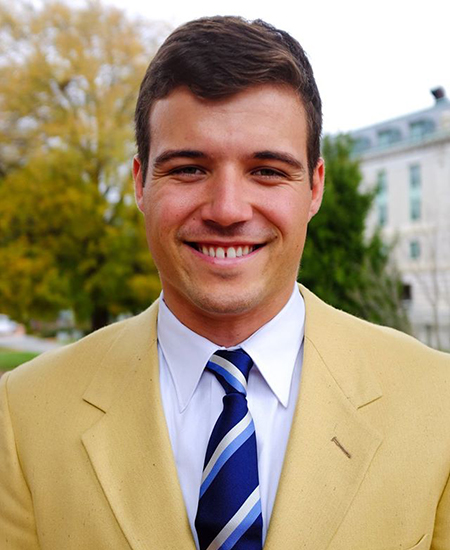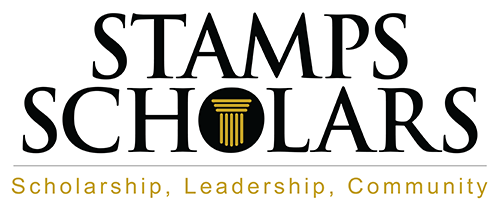 Degree: B.S. in Mathematics
Degree: B.S. in Mathematics
How did the Stamps Scholarship help shape your undergraduate experience?
The Stamps Scholarship helped fund a summer class at the London School of Economics and a semester abroad at Yonsei University in Seoul, South Korea.
Knowing what you know now, what advice would you give your freshman self?
Enjoy your friends, and focus more on personal development. Involvement is an awesome way to meet people, but being too busy stunts much of the self-actualization for which college years should be used.
Who has had the greatest impact on you throughout your college career and how so?
My comrades at the academy; roommate and closer friends. They are the reason I stayed at USNA when offered the opportunity to leave after freshman year. They also directed me towards a career path that has become my passion.
Please share your most memorable Stamps Scholar experience.
The first week studying abroad in Korea was a whirlwind, filled with series of orientation briefings and trips into greater Seoul. This particular semester, I studied at Yonsei University in a program through CIEE.
Here I was warned about the extreme deference shown to elders. I have read about it in many sources mentioning the deep Confucian values that prevail into contemporary times. But when I witnessed it first hand, I was at a loss. After a long day of a scavenger hunt all around Seoul, my group was on a subway ride back to the rendezvous point. Accompanying us were a couple of Seoul mates (Seoul natives who volunteer to help us foreigners enjoy our time here) who staffed the day’s activities. We were all abuzz, excitedly speaking of the days happenings while also making plans for the night. Apparently it is good etiquette to be quiet in the subway–for an older man let us know. From his seat (because elders sit before women) he violently waved a rolled up newspaper at the Koreans with us. Her reaction was silence and a gyration of movement which was intended to be a rapid series of bows. He went on waving and scolding her. She just took it. The criticism went on for a good two minutes. She apologized profusely and held her head down. All of us Americans quieted in awe. When I asked her about it later, she explained, but shamefully. I was angered. This man had the gall to embarrass a friend of mine and be so rude as to wave and point at her. But I was also frozen during the engagement. This was a culture shock.
After a few more subway rides, I began to notice a kit, a Damage Control Locker of sorts. With the words “Relief Goods Storage” posted against the front there are smoke masks, food, lights, batteries, and various other miscellaneous items. Another part of Korean culture very much not present in American subways. Then again, we are not at war with a communist country that shares a border.
Next day when walking out of the main gate of campus, the air was a bit stale. It smelled like typical Seoul: eclectic and a bit too humid. But something felt still, there is not usually much wind, so I was at a loss. Looking around, it was not just the air, but the whole environment. People were gathered on street corners, but not moving. The police even stood stationary in the intersection. And that was it, the intersection. No cars were moving. In this sprawling metropolis, loud and vibrant traffic is the norm. But at this moment, all the motors sat in idle. I suppose I expected some noise. If the cars were stopped, at least a public march or demonstration should be happening. But there were neither. Rumors circulated that it was simply a police exercise of sorts. So strange, but yet another cultural disparity between the United States and South Korea.
Overall Korea was welcoming, especially to military members. In my travels, Korea is only rivaled by the Scottish highlands in its kindness to citizens. But with regards to welcoming foreign military members, it is on a level all by its lonesome.
Plans after graduation?
I’m heading to Stanford for two years to pursue a Master’s of Science in Mathematical and Computational Finance. After that I will begin training to be an Explosive Ordnance Disposal officer in the United States Navy.
